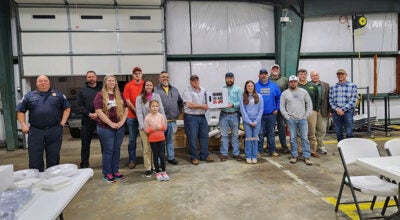Staffing turnover impacts auditing process
Published 6:24 pm Friday, June 11, 2021
|
Getting your Trinity Audio player ready...
|
Key staffing turnover for the Town of Windsor led to a significantly delayed auditing process for the fiscal year ending June 30, 2020.
Aaron Hawkins, with Robinson, Farmer, Cox Associates, gave his audit presentation on Windsor’s FY 2019-20 budget during the June 8 Town Council meeting at the Windsor Town Center.
“Obviously the goal is not for me to be here on June 8 of the following year,” he said. “I should be here November or December of the year in which the audit’s being done, and the reason that’s not happening is turnover at the town.”
In a June 9 interview, Windsor Mayor Glyn T. Willis noted that the town had turnover at both the town manager and treasurer positions in 2020, and he described the situation this contributed to with regard to the audit.
“(It was) just a series of consequences of kind of combining a pandemic, which was making it difficult for them to get a lot of things done, with people turnover, where we’re then having to bring in interims to keep the town going (who) wouldn’t have all the background or necessarily be able to dive into things at the same level that you’ve got when you’ve got either the previous person there or a new person that’s picking this up, knowing that they’re going to have to work it from end to end,” he said.
During his presentation, Hawkins said the previous treasurer left “probably right around the time we would have started to prepare for our final field work.”
He said he and the firm sent out a planning letter detailing some things they needed, and the treasurer at the time sent them quite a few things they would use to audit numbers if they were to eventually receive those numbers.
“The problem is, we never eventually got those numbers, and when I say numbers, that would be the trial balance that comes through the town that shows, ‘This is our year-end numbers for the year,’” Hawkins said. “We never got those, and then the town manager, after a few months, emailed me and was like, ‘How’s the audit going?’ And I told him we’re still waiting on this trial balance and some other things that were on our planning letter that we still need as well.”
Hawkins stated that at that time, there was an interim treasurer in between the previous treasurer and current Treasurer Cheryl McClanahan, and Hawkins said he and the firm just were not able to get what they needed from the interim treasurer.
“And then Cheryl came in and was able to kind of get the gears going a little bit and get us some things,” he said. “And even then, the trial balance that we got was out of balance, and when I say out of balance, in accounting, there’s debits and there’s credits, and at the end of the day, those debits and credits should equal, and they weren’t in a bunch (of cases).
“So we had to do some digging to try to figure out what those problems were, which isn’t something that I, as an auditor, normally would partake in,” Hawkins added. “Normally that’s the job of the town management.”
But he said he was able to work with McClanahan and get to a point where they could figure out the problems that were going on within the accounting system.
“(We) got some numbers that we could work with, started getting through all our remaining requests to get through the audit, and that’s where we’re here now to finally present the final audit report to you,” he said.
Describing the practical impact to a town when its audit report is six to seven months later than it ordinarily would be, Willis said if things are going fairly well with the town’s financial operations and there are no problems, there is not much of an impact.
“If there are problems, it’s a case of those problems aren’t being caught until a significant time later, which could magnify the problem,” he said. “We didn’t have problems.”
He said the Town of Windsor had what he considers some typical transaction issues.
“The sooner you can catch them within the fiscal year that they occurred, you’ve kind of got that paper and files already there,” he said, also noting that going through the auditing process sooner makes it easier for staff to recall situations auditors ask about. “We were in the added situation where we had a new treasurer, so every question that came in for Cheryl was her saying, ‘OK, I’m going to dig in, research that and figure that out,’ and she’s done an excellent job of that.”
Efforts are already underway to avoid delays with Windsor’s FY 2020-21 budget audit, as Hawkins indicated he would be working with McClanahan on some things starting June 11.
Willis said the town is usually in contact with the auditors through the November/December timeframe and then is back in contact with them after the end of the fiscal year, which comes June 30.
“Since (Hawkins has) been here working with us closely, as during this extended time for last year’s audit, it’s just a good opportunity to kind of get ahead of some things,” Willis said.
With McClanahan becoming established in the town treasurer position, William Saunders is in a similar situation as town manager, having just successfully completed his first Windsor budget process after beginning his town management duties Aug. 17, 2020. He succeeded Michael Stallings.
Windsor has also experienced turnover at the zoning administrator position, but Willis stated that the previous zoning administrator had left before Stallings did, and the zoning position’s status has been a product of town prioritization.
“We had the zoning administrator leave, then Michael left, and then the treasurer left, and our prioritization of getting people back in place was the town manager and then the treasurer, and William’s been working to fill the zoning administrator position,” Willis said.
But Willis affirmed the town staffing turnover was an issue that was restricted to 2020 and is no longer current.
“At least my observations on things — people work in Windsor because they like working there for a number of reasons,” Willis said, “and my observation is we’ve had low turnover during the years that I’ve been watching.”
He estimated the previous non-interim treasurer had been with the town for four or five years, and he said that Stallings, who now manages the Town of Smithfield, had been with Windsor for 10 years.




